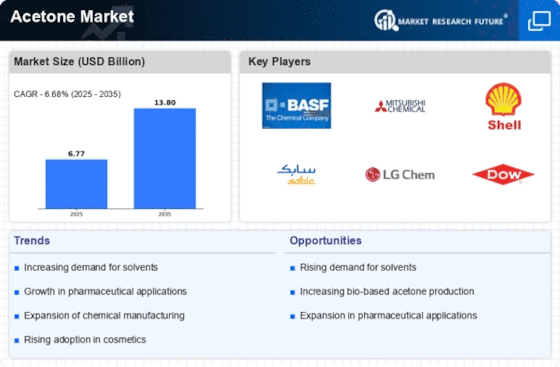Top Industry Leaders in the Acetone Market
 Acetone, a ubiquitous solvent employed in diverse industries, finds itself amidst a dynamic and evolving market landscape. Understanding the intricacies of this landscape, from competition and market share drivers to recent developments, proves crucial for navigating the future of this vital chemical.
Acetone, a ubiquitous solvent employed in diverse industries, finds itself amidst a dynamic and evolving market landscape. Understanding the intricacies of this landscape, from competition and market share drivers to recent developments, proves crucial for navigating the future of this vital chemical.
Key Players and Strategies:
-
Global Giants: Leading the pack are established chemical giants like INEOS, Dow Chemical, and Shell, leveraging economies of scale, extensive distribution networks, and diversified product portfolios. INEOS, for instance, recently acquired BASF's European and North American acetone assets, solidifying its position as the top producer. -
Regional Champions: Regional players like Formosa Chemicals & Fiber Corporation (FCFC) and Mitsui Chemicals carve niches through cost-competitiveness and strategic partnerships. FCFC, with its vertically integrated production model and Asian market stronghold, poses a significant challenge. -
Innovation Hubs: Smaller players like Altivia and Cepsa differentiate themselves through innovative production processes and sustainable practices. Altivia's bio-based acetone production, aiming for reduced environmental impact, attracted a €120 million investment from L'Oréal, showcasing the growing importance of sustainability.
Factors Influencing Market Share:
-
Demand Drivers: The growth of end-user industries like construction, automotive, and personal care propels acetone demand. Rising urbanization in Asia-Pacific, particularly China, fuels the construction sector, consequently boosting demand for MMA, a key acetone derivative used in building materials. -
Regional Dynamics: Asia-Pacific dominates the market, accounting for over half of global consumption, driven by rapid industrialization and rising disposable incomes. Europe and North America, though mature markets, witness steady growth fueled by stringent environmental regulations and the adoption of bio-based acetone. -
Feedstock Fluctuations: The price and availability of key feedstocks like propylene and isobutene significantly impact production costs and market dynamics. Fluctuations in oil prices, as witnessed in the past six months, can lead to volatile acetone prices, affecting profitability and competitiveness.
Key Companies in the Acetone market include
- Honeywell International Inc
- Dow
- Ineos
-
Formosa Chemicals & Fibre Corp - BASF
- Mitsui Chemicals Inc
- Shell Chemical Co
- LG Chem Ltd
- Reliance Chemicals Pvt Ltd
-
Kumho P & B Chemicals
Recent Developments:
-
October 2023: Chinese acetone prices decline due to weakening demand in the construction sector amidst concerns about a potential property market slowdown. -
November 2023: The European Union proposes stricter regulations on VOC emissions from paints and coatings, which could impact the demand for acetone used as a solvent in these industries. -
December 2023: Mitsui Chemicals and Mitsubishi Gas Chemical Company announce a joint venture to explore the production of acetone from methanol, a potentially cost-effective and sustainable alternative to traditional methods.










